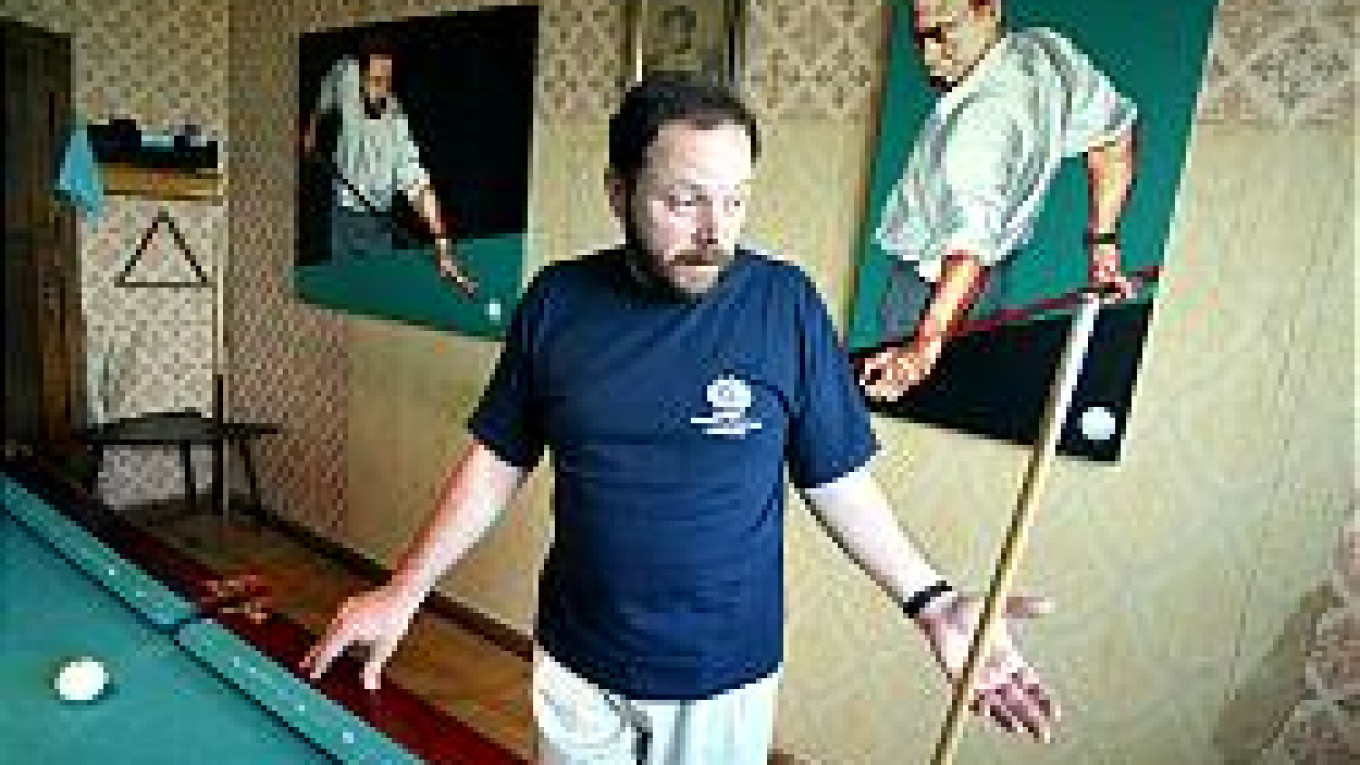The third time didn't prove to be the charm for the journalist, who before TVS was forced to leave NTV and TV6. So shortly after the Press Ministry pulled the plug on TVS on June 22, he decided it was time for a career change rather than a career turn.
Moving to the boiler room was kind of a step back to Soviet times. Back then, Kara-Murza deliberately spurned work that might be considered a career, opting instead to tutor schoolchildren in history and later sweep courtyards.
"I didn't think it was right to profit under a criminal regime," said Kara-Murza, 43. "I believe that we have returned to a regime where it is shameful to prosper."
Working as a courtyard cleaner or boilerman were the chosen jobs of disillusioned Soviet intellectuals, since the work came with free housing and flexible working hours. Most important, it meant they were not working directly with the state. Rock singers Boris Grebenshchikov and Viktor Tsoi, a friend of Kara-Murza's, both worked in boiler rooms.
Kara-Murza, sitting in the kitchen of his apartment in the Baumanskaya district and just a few minutes' walk from his boiler room, on Wednesday animatedly and wittily explained his career move and vented his anger at the decision to switch off TVS.
"They destroyed my program," he said. Pointing to his television set, he added, "I don't watch Soviet television anymore, just videos."
Kara-Murza is a Tartar name meaning "Black Prince." The name is linked to a number of famous characters, including 18th-century historian and author Nikolai Karamzin. Karamzin is the Russified version of Kara-Murza.
Although Kara-Murza said he is not linked to any political party, his family is. A brother, Sergei, is a leftist who regularly writes for the Zavtra newspaper and is a founding member of a new party set up by former Communist Sergei Glazyev. Another brother, Alexei, is believed to be the political ideologist behind the liberal Union of Right Forces party.
"One of them is a red, another a white," Kara-Murza said. "But we still sit down and eat together."
His son, Vladimir, is expected to run as an SPS candidate in December's parliamentary elections.
Kara-Murza's apartment is cozy, with a feel of messy clutter and Soviet simplicity, and looks as if it hasn't been renovated since it was built in the 1930s.

Igor Tabakov / MT Kara-Murza showing the boiler room where he now works. Since his district's hot water is turned off, he is on a summer vacation. | |
Opening one of the cupboards, Kara-Murza pointed to marks where a child had his height measured. They move up the cupboard door a few millimeters at a time before abruptly stopping at Sept. 12, 1937. Kara-Murza explained that the parents, who worked in the Tupolev factory, were taken away by the KGB on that date and shot.
The only striking modernity in the apartment is an electronic dartboard and pool table in one room. Around the table hang paintings by Dmitry Vrubel, perhaps best known for his picture of Leonid Brezhnev and Erich Honecker kissing. One painting shows Kara-Murza taking an ordinary straight shot on a pool table. Another is of President Vladimir Putin taking trick shot. Kara-Murza is an avid player, and he showed off a collection of trophies.
Asked if Putin can actually play pool, he said scornfully, "He can't play at all."
Kara-Murza, a history graduate from Moscow State University, got his break in television when he was offered a job by a close friend from university, NTV co-founder Oleg Dobrodeyev. In one swift move, he switched from being a courtyard cleaner to the editor of "Itogi" on NTV.
If Dobrodeyev had not been working in television, Kara-Murza would have had a completely different career.
"If he had been the coal minister, I would have been the director of a mine," Kara-Murza said.
But the two stopped talking when Dobrodeyev threw in the towel at NTV and became chairman of the All-Russian State Television and Radio Co., the state-owned media holding.
Kara-Murza clearly remains upset about the events at NTV, TV6 and TVS. He pulled out a magazine showing the high ratings of his programs in the month before TVS was taken off the air.
"If we had still been working, the Yukos and Deripaska affairs would already be over," he said, adding that NTV's coverage of Vladimir Gusinsky's arrest in 2000 had secured his release. "Now we do not exist, and they are being questioned."
He is disappointed with his former colleagues who returned to NTV, and he turned to an elongated metaphor to explain the two types of journalists. "There are ants and flying ants," he explained, his fingers fidgeting on the pool table. "But if you pull off the wings, that doesn't make them ants. ... There are millions of years of evolution between them."
Once hot water is turned on again in his district after the monthlong summer break, Kara-Murza will return to work in the boiler room -- two days on, two days off -- for 4,500 rubles per month.
Kara-Murza said he will not make a career of journalism again. He said the work he intermittently does now for Gusinsky's RTV International channel -- which broadcasts in Israel and the United States -- and Ekho Moskvy is for free.
"I'm not a professional television presenter. I lived in a particular pool," he said, referring to the group of journalists that hopped from NTV to TV6 to TVS. "I can't go to another collective."
But should he ever decide to return to news, he said, there's always the option of using the method he talked about with cartoon characters Stepan and Khryun on the TVS series "Tushite Svet." They discussed simply going from domophone to domophone presenting the news.
A Message from The Moscow Times:
Dear readers,
We are facing unprecedented challenges. Russia's Prosecutor General's Office has designated The Moscow Times as an "undesirable" organization, criminalizing our work and putting our staff at risk of prosecution. This follows our earlier unjust labeling as a "foreign agent."
These actions are direct attempts to silence independent journalism in Russia. The authorities claim our work "discredits the decisions of the Russian leadership." We see things differently: we strive to provide accurate, unbiased reporting on Russia.
We, the journalists of The Moscow Times, refuse to be silenced. But to continue our work, we need your help.
Your support, no matter how small, makes a world of difference. If you can, please support us monthly starting from just $2. It's quick to set up, and every contribution makes a significant impact.
By supporting The Moscow Times, you're defending open, independent journalism in the face of repression. Thank you for standing with us.
Remind me later.


